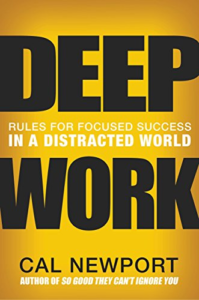Deep work significantly impacts all three of the aims of this blog: time, money, and what matters most. In this post I will define deep work. Then, I’ll show how it helps you have more time and money and how it helps you realize what matters most in life. Finally, I’ll share four ways to infuse your life with deep work.

Einstein modeled deep work, employing intense focus to achieve greatness.
Definition of Deep Work
The concept of “deep work” comes from the 2016 bestseller Deep Work: Rules for Focused Success in a Distracted World by Cal Newport.
Newport defines deep work as “professional activities performed in a state of distraction-free concentration that push your cognitive capabilities to their limit. These efforts create new value, improve your skill, and are hard to replicate.”
Examples can range widely from fashioning Viking swords to creative writing to a personal, nerdy example: writing formulas to build high-functioning spreadsheets.
The opposite of deep work is “shallow work”—noncognitively demanding, logistical style tasks, often performed while distracted.” Examples include filling out expense reports, replying to instant messages, and engaging in social media.
How Deep Work Benefits Time, Money, and What Matters Most
1. Benefit on Time
Work tends to follow the 80/20 Rule. Most knowledge workers spend an inordinate amount of time on shallow work. But that work is only responsible for 20%, say, of their gains. Deep work, on the other hand, is—or has the potential to be—responsible for 80% of the gains.
By engaging in deep work, we can realize significant gains in a modest amount of time. Or, if we make deep work a way of life and fill our time with it, we can realize unprecedented breakthroughs.
2. Benefit on Money
Deep work is valuable. Shallow work is easily replicated; those who do it can easily be replaced. Deep work, by contrast, creates new value. Those producing the fruits of deep work cannot easily be replaced.
Deep work is rare. We live in an age of unprecedented distraction. To engage in deep work, one must withdraw from such distraction. But that is very hard to do. And most folks, in fact, don’t do it.
The value of deep work, coupled with its rarity, gives rise to a financial opportunity for those capable of it. Newport summarizes, “The ability to perform deep work is becoming increasingly rare at exactly the same time it is becoming increasingly valuable in our economy. As a consequence, the few who cultivate this skill, and then make it the core of their working life, will thrive.”
3. Benefit on What Matters Most
My favorite part of the book discusses how deep work can benefit what matters most in life, not only indirectly—through increased time and money—but directly.
Deep work fully engages you in something you were born to do. You are stretched to the limits of your mental or physical capacity. You are in the zone. Time flies. You are fully alive. And you’re producing the best you have to offer.
An example from my life is when I’ve run the annual, 5-week training for hundreds of members of the company I work for. The reward is not only the fruit of the work but the very work itself—the sense of being stretched to my limits in a voluntary effort to accomplish something difficult and worthwhile.
This sense of flourishing is the crowning gift of deep work, and one well worth pursuing.
4 Ways to Engage in Deep Work
If you’re convinced of the value of deep work and inspired to strive for it—the aim of the first part of the book—the question then becomes: How do I infuse my life with it?
The second (final) part of the book includes 4 ways to add deep work to your life. They are:
- The Monastic Philosophy. The idea behind this philosophy is, essentially, to cut yourself off from society to plunge fully into your pursuits. This philosophy is best suited to intense knowledge work. Many of history’s great minds adopted this philosophy. But it is impractical for most people.
- The Bimodal Philosophy. In this approach, you dedicate significant periods of time to deep work, leaving other times for shallow work. The deep work periods could be as short as a day per week or as long as a season of the year, as academics sometimes adopt over the summer. In my own work, I strive to carve out at least a day or two each month for deep work. I find such time difficult to come by, but those days are always my most productive by far.
- The Rhythmic Philosophy. The monastic and bimodal philosophies involve significant departures from everyday life. The goal of the rhythmic philosophy, by contrast, is to build deep work into your everyday routine. You make deep work a habit. You could commit the first two hours of your work day, for instance, to distraction-free work. I think this approach would be feasible in my own life and would bear more fruit than the following philosophy, which I attempt to live.
- The Journalistic Philosophy. Not for the novice, the journalistic approach fits deep work into one’s schedule whenever possible. For instance, during an hour break between meetings, you could try to go deep on a project. As Newport points out, making such an abrupt switch to deep work doesn’t come naturally. To stick with the example, one minute you are talking with others. The next minute you are supposed to be concentrating intensely in a distraction-free environment. It’s not impossible, but it isn’t easy. It is certainly better than only ever engaging in shallow work. But better still, I’d say, would be to direct your efforts toward adopting the bimodal or rhythmic philosophies.
Summary
In summary, deep work helps us make the most of our work time. Because deep work is valuable but rare, those who engage in it stand to profit. And, most importantly, it enables us to flourish—to enjoy giving the very best we have to offer.
Question: Do you have examples of flourishing as a result of engaging in deep work? I’d love to hear them. You can leave a comment by clicking here.
If you liked this post, why not join the 5,000+ subscribers who receive blog updates on how to have more time and money for what matters most? Sign up here.


Brian, great job breaking it all down and I agree we all need more segments of deep work in our lives (whichever method you choose). Deep Work prompted three posts from me (three different places), two about (mostly) the “attention” piece —- his book really made me look at taking care of my attention and not letting it be given away digitally. BUT —- I feel differently than he does about social media. While I respect his choice not to be on social media, I firmly believe it isn’t *all* shallow (I mean — you and I are talking here thanks to Twitter) and one of the reasons his book is a best seller is (wait for it ….) the fact that so many of us are talking about it on social media! If you have any interest, these are some of my thoughts about that angle on things. http://bit.ly/2jOwifn
Hi Paula,
Thank you for commenting. I read your post and appreciate it. I am grateful for social media and for being connected with you via Twitter as well!
I did feel convicted by Newport of the importance of going deep. I used to be better at doing so than I currently am, which bothers me. It’s tough to pinpoint the causes, and I think there are many. But I suspect that immediate gratification of email and social media plays a role.
I agree with the concept of having a generosity mindset, which you mention. Have you read Adam Grant’s Give and Take? If not, you’d love it in that regard.